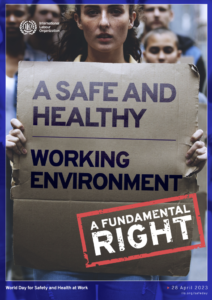Published on 28th April 2023
 A safe and healthy working environment is a fundamental principle and right at work. One year after including this right in its framework of fundamental principles and rights at work, the ILO will discuss its implications when implementing it in the world of work. On 28 April – on the occasion of the World Day for Health and Safety at Work – the ILO will present research findings on the implementation status of various provisions of the fundamental Conventions No. 155 and No. 187, its Fundamental Conventions on Occupational Safety and Health.
A safe and healthy working environment is a fundamental principle and right at work. One year after including this right in its framework of fundamental principles and rights at work, the ILO will discuss its implications when implementing it in the world of work. On 28 April – on the occasion of the World Day for Health and Safety at Work – the ILO will present research findings on the implementation status of various provisions of the fundamental Conventions No. 155 and No. 187, its Fundamental Conventions on Occupational Safety and Health.
Respect for Health and Safety at Work is also a core principle defended by the HR services industry. One of the ten principles in the Code of Conduct established by the World Employment Confederation, it requires that private employment services shall act diligently in assessing risks to promote the health and safety of workers in their workplace and that they shall inform workers whenever they have reason to believe that any particular assignment causes an occupational health or safety risk.
Agency workers are more likely than permanent employees to have an accident in the first three months of work, for various reasons, including more young people, lateral entrants, newcomers and returnees, and the many professions involving manual activities. One reason should, however, always be unacceptable to explain accidents: insufficient occupational safety training and awareness. The sector has therefore taken up its social responsibility and developed voluntary initiatives to ensure agency workers’ health and safety at work. See below a couple of examples from WEC members around the world.
During the Covid-19 crisis, the HR services industry also paid close attention to the health and safety of agency workers, especially as those were often in frontline jobs. In 2021 the World Employment Confederation adopted guidelines relating to occupational health & safety protocols to be applied to agency workers regarding vaccination, testing, basic protective measures, public health interventions, and tracing. The overall objective was to ensure that the same equal standards and practices were applied to agency work personnel as to user companies’ personnel.
Beyond health and safety at work, the agency work sector also has a long-standing tradition of ensuring social protection, including access to sickness benefits. As for other holders of regulated labour contracts, agency workers enjoy statutory access to such benefits. In nine out of ten countries surveyed in the WEC Social Impact Report 2020, full statutory access to healthcare insurance is available to workers on an employment contract. Regarding labour accidents/disability insurance, agency workers were fully covered in nearly all countries in the sample. In contrast, self-employed workers had full statutory access to insurance in only one-third of the countries.
Social dialogue has been central to improving working conditions and social protection for agency workers. The topic is still a focus for the EU Sectoral Social Dialogue Work Programme 2021–2023, agreed upon by WEC-Europe, WEC’s European regional federation, and UNI-Europa, representing the European trade unions.
Swissstaffing (Switzerland) – An occupational health and safety industry solution
swissstaffing developed an occupational health and safety industry solution QAS (Quality and Safety), certified by the Federal Coordination Commission for Occupational Safety. This solution offers staffing agencies in Switzerland information and training to ensure that agency workers operate in safe conditions. It clarifies the responsibilities between staffing agencies and contracting companies, and thus should ultimately reduce the number of accidents for agency workers.
ASEMPLEO (Spain) – Accidents protocol for agency workers
ASEMPLEO developed a protocol to clarify the responsibilities of each party when an accident at work occurs, whether it is up to the temporary work agency, the client company, or both. The protocol was based on information collected through a survey, roundtables and workshops. It was particularly important to first understand what was known about accidents at work as well as the issues and difficulties that arise in the sector and second to take into consideration the different laws and regulations that exist and may differ across the different regions of the country. 5800 agency workers benefitted from that increased support and ifnormation.
FEDERGON (Belgium) – Prévention & Intérim
Belgian social partners for the temporary agency work sector, including Federgon representing the temporary agencies, created a bipartite body in 1998 as the central prevention service for the sector. This body “Prévention & Intérim” (PI) works closely together with temporary work agencies to disseminate information materials and organise workshops, study days as well as training courses on health and safety at work. The accidents frequency rate decreased by 60% while the severity rate decreased by 50% between 2000-2019 thanks to PI actions.
ASA (United States) – Safety Matters: Keeping Temporary Workers Safe on the Job
The American Staffing Association (ASA) is joining forces with the Occupational Safety and Health Administration (OSHA) have joined forces to develop and execute a strategic plan to protect the health and safety of temporary workers in the U.S.A. They regularly share resources specific to agency workers, notably in specific situations like the holiday shopping season, cold weather period, return to work after the Covid-19 pandemic, etc.